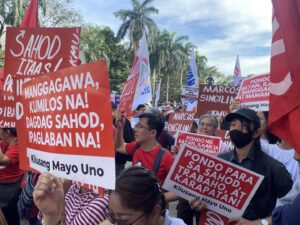📷Kilusang Mayo Uno | FB
The Lower House may have raised the minimum wage by P200, but the amount is so puny it may not have any impact at all in an economy where fuel prices increase practically every week, and where rice prices are stuck in the P48-P60 per kilo range despite a glut in the market that should have reduced the prices of imported cereal.
Lawmakers may gloat about approving the pay raise but it is only 16.6% of the demand of Filipino workers that Congress approve a legislated P1,200 family living wage nationwide to benefit workers in all regions. For Kilusang Mayo Uno (KMU) secretary general and Makabayan senatorial candidate Jerome Adonis and millions of workers, the P1,200 is a fair amount for workers who have been efficient and productive, belying claims by some researchers that Filipino workers are overpaid.
Workers nationwide suffer not from regional crises but from structural injustice and it is a myth that workers in the regions enjoy lower food prices and should receive lower wages. This is untrue as transport fares and power and water tariffs are higher in the provinces. Adonis backs the proposed bill of Gabriela Women’s Party Rep. Arlene Brosas, who seeks a P750 across-the-board wage increase aside from dismantling the regional wage boards (RWBs) that have, for decades, depressed wages and promoted a low wage regime. Other bills also seek higher wages and additional benefits for workers.
KMU argued that workers staged a mass action at the Batasang Pambansa on Jan. 30, 2025 to drum up support for its call for Congress to finally wake up from its exploitative slumber and increase the pay of workers. The approval of a P200 wage hike by the Lower House’s Committee on Labor and Employment is the result of the persistent assertion by KMU and other labor groups that Filipino workers have been underpaid, overworked and denied their basic right to freely organize, as what is happening in Nexperia Philippines and a legion of companies in export processing zones, where foreign companies enjoy tax perks and special treatment while their workers are condemned to low wages.
For KMU, demanding the P1,200 family living wage and winning it will not even guarantee that workers will rise in the social ladder. It is but a recognition that workers who have fattened the pockets of local and foreign corporations deserve higher pay. “Ang P200 dagdag sahod ay bunga ng tuloy-tuloy na paggigiit ng manggagawa at mamamayan para itaas ang sahod, subalit malayo pa ito sa antas ng nakabubuhay,” Adonis reiterated. said KMU secretary general and Makabayan senatorial candidate Jerome Adonis. He cited the international statistical portal Statista as reporting recently that as of the second quarter of 2024, labor productivity in the Philippines reached P112,500, 4.6% higher than the previous quarter. Statista reported that first quarter of 2021 registered the lowest labor productivity at P98,700. Labor productivity is measured by gross domestic product (GDP) per person employed.
To bolster KMU’s argument, Adonis noted that the independent IBON Foundation also confirmed in May 2023 that worker productivity has been a driving force of economic growth in the past decade. Measured at constant 2018 prices, IBON Foundation labor productivity increased by 28.9% from P330,035 per worker in 2012 to P425,511 in 2022. IBON reported that the figure released by the Philippine Statistics Authority (PSA) confirmed that while worker productivity has been increasing, real wages are actually decreasing. “The gains from growing productivity are not going to workers as higher wages but to the profits of corporations and the wealth of the super-rich” IBON stressed. Giving workers their fair share through decent wages will uplift their lives and spur economic progress, it argued.
KMU revealed that while the economy grew by 60.2%, with GDP increasing from P12.4 trillion in 2012 to P19.9 trillion in 2022, real wages did not cug along. The average daily basic pay (ADBP) grew by less than 21% from P391 in 2012 to P472 in 2022, measured at constant 2018 prices. Wages have not kept up with inflation even as the consumer price index (CPI) increased by 35.3% from 85 in 2012 to 115 in 2022. Workers have been asked to sacrifice not only their labor but also their future by staying in enterprises that have grown immensely while their pay stagnated.
When wages skid even labor productivity soars, the benefits from economic activity go to corporate profits. IBON revealed that the profits of enterprises of all sizes increased by over 72% from P2 trillion in 2012 to P3.4 trillion in 2019 before the lockdowns. For the Top 1,000 corporations in the country, profits increased by nearly 35% between 2012 (P1.1 trillion) and 2019 (P1.5 trillion), and then by another 25% between 2019 and 2021 (P1.8 trillion.) To correct this injustice, KMU has demanded that the legislated family living wage should be P1,200 from the living wage of P1,103 three years ago. (DIEGO MORRA)




